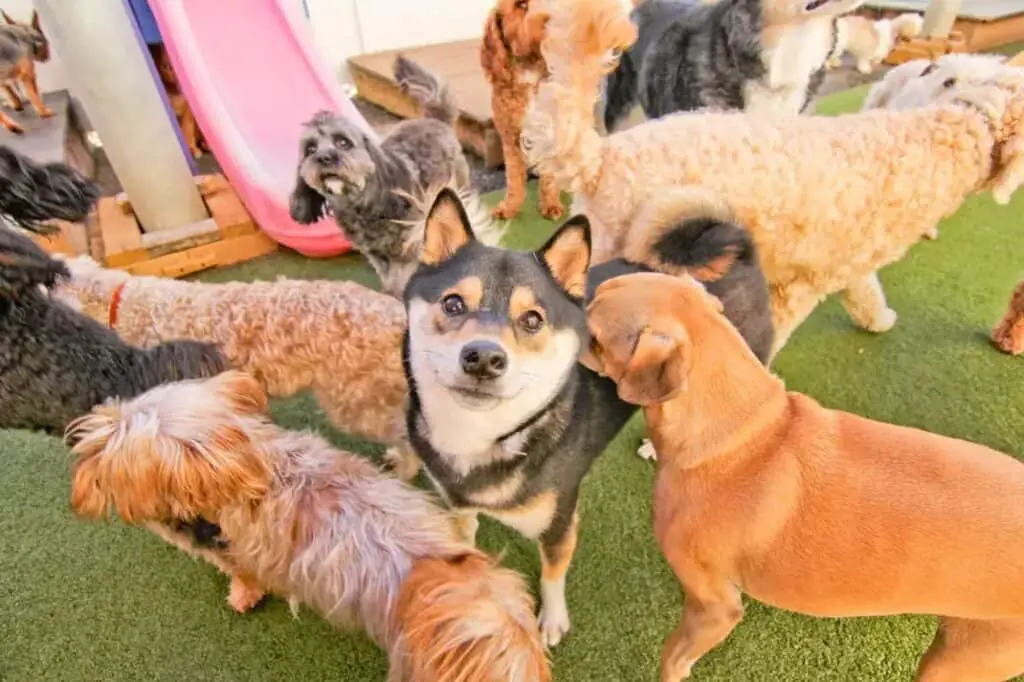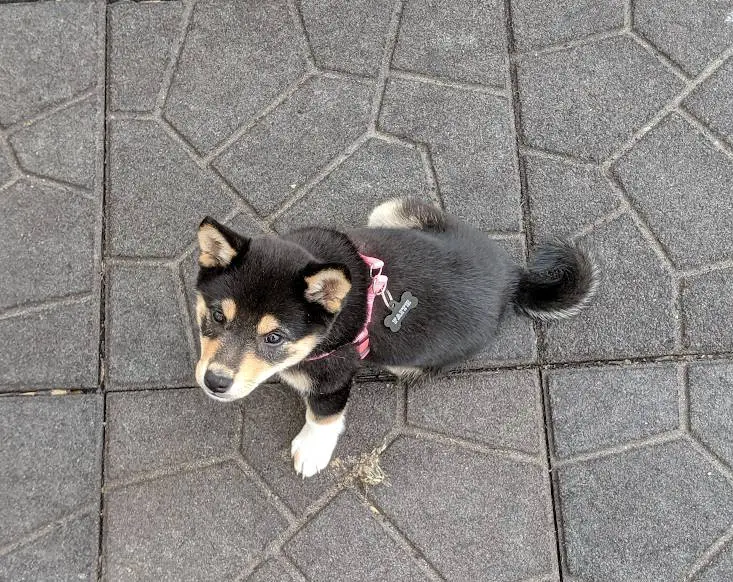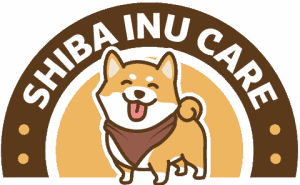This post contains affiliate links.
Socializing is and continues to be, a sticking point for Shiba Inu owners. And it’s a pitfall I struggled with for the first few months after getting my Shiba Inu, Faith.
Shiba Inus don’t have the same innate social skills more modern dog breeds have. Shibas are a basal, primitive, breed. Making social interactions with both new people and pets is critical for them to properly grow and develop into well-behaved adults.
Social settings can be a real struggle for those who were expecting it to be a breeze, like it may have been for previous family pets. Unfortunately, Shiba Inus are a bit different. They’re aloof, can have a quick temper, and are commonly referred to as antisocial for good reason. They, on average, don’t like and aren’t friendly to strangers.

Why Is It So Important To Socialize A Shiba Inu?
Shiba Inus are an ancient basal breed that’s commonly aloof, fearful, or aggressive towards strangers and other pets. Proper socializing teaches your Shiba Inu fundamental skills around how to interact with others, along with how to handle their own stress or fear. With time, proper socializing can also curve aggressive behaviors like excessive barking or snapping at others.
When Should I Socialize My Shiba Inu?
Shiba Inus are best socialized as puppy’s before they have the opportunity to develop bad social habits. It’s best to start socializing your Shiba Inu as soon as you get them. Waiting to socialize your pet can lead them to be more fearful or even aggressive towards new people, pets, or situations.
How To Socialize Your Shiba Inu
Start easing your Shiba into social situations gradually. This’ll help them build up their tolerance to new people, animals, and stresses. It also makes them easier to manage if something were to go sideways. I would start socializing your Shiba with the following:
Have Friends And Family Visit
Once you and your Shiba are comfortable with one another it’s time to start introducing them to new people. Friends and family are a great place to start. Keep the interactions short at first while you gauge your Shiba’s response.
- Does your Shiba look worried?
- Are they being friendly?
- Is your Shiba posturing aggressively?
- Has your Shiba tried playing with them?
- Did your Shiba Inu run away and hide?
All of these are important questions to ask yourself and check off with each new person your pet meets. Over time, with routinely positive results, I recommend you transition from people to other pets.
Ask Fellow Dog Walkers For A Quick “Hello”
Short and sweet social interactions are usually easy to set up, and many pet walkers would be happy to quickly say hello. Just be sure to keep an eye on how your Shiba handles the interaction.
- Are they friendly?
- Do they seem stressed?
- Are they acting or posturing aggressively?
Tip – Hikes are an excellent way to socialize your Shiba when they’re a bit older.
Obedience Training Classes
Obedience training classes aren’t just for teaching your Shiba, they’re also a great place for your pet to socialize with other dogs and pet owners. The dogs are supervised and any inappropriate behavior is managed accordingly.
Visit A Dog Park
Dog parks are an excellent way to keep your Shiba happy, healthy, and socially active. Most cities and towns have a local dog park or two that’s full of new sights, sounds, people, and pets for your Shiba Inu to meet and explore.
Schedule Play Dates With Other Pet Owners
Once your Shiba Inu’s gotten better at meeting, greeting, and playing with new pets for short periods of time it’s time to ramp up the difficulty. Shibas may pass the “social sniff test” on short interactions, typically by keeping to themselves or sticking to light sniffing. You may find your pet acts differently when those short interactions jump from a few minutes up to 10, 15, or even 30 minutes.
Tip – Keep an eye on if your Shiba is better with larger or smaller dogs.
Doggy Daycare And Pet Boarding Services
Doggy daycare is a great way to keep your Shiba Inu socially active, similar to dog parks, but are instead supervised by trained staff instead of you and other pet owners. Many places that offer daycare even offer pet boarding services. Where your Shiba will be fed, walked, and get plenty of one-on-one time with staff and other pets.
Stay Positive And Be Patient
Shibas are smart but stubborn. Like all training, these things take consistent effort, proper discipline, and time for them to develop good habits. Yelling, hitting, or dragging your Shiba to or from social interactions will only stress them out and result in them becoming more fearful and aggressive. Take things slow, go at a pace both you and your Shiba can maintain, and be consistent.
Extra Steps To Take When Socializing A Puppy

If your Shiba Inu is still a puppy it’s even more important that you take things slowly. Don’t rush your puppy into boarding or lengthy play dates, instead start with:
Focus On Getting Your Puppy Use To You
Shiba Inus on average are more friendly and affectionate toward their owners, forging a loyal bond that’ll last a lifetime. That bond you share with your Shiba Inu starts when they’re a puppy, with them getting to know you. Some great ways to get your new Shiba used to you are:
- Play
- Walks
- Hand feeding
- Training
You can also give them one of your shirts or jackets when you put them in their crate at night. They may chew on it, so pick one you aren’t worried about potentially losing. But that shirt or jacket will help get your Shiba use to you and your smell, helping them better identify and bond with you.
Start Checking For Food Based Aggression
Shibas are commonly seen as a more “anti-social” dog breed that keeps to themselves. That standalone nature can lead them to be overly aggressive with food, toys, or even parts of your house like their cage or your bed. Aggressive and even antisocial tendencies are easier to remedy while a Shiba Inu is still a puppy, and a great place to start is by checking for food aggression.
Food aggression typically shows itself as wide-eyed staring, showing teeth, growling, or even snapping while a Shiba is standing or laying near their food bowl. They may not just be aggressive toward you, your partner, your friends, or even other pets in the house.
You can remedy food aggression by slowly hand-feeding your Shiba Inu. Eventually working your way to putting their food in a bowl and randomly placing your hand on their food or even grabbing some. Ideally, you don’t want them to bite you.
Let Your Puppy Explore Their New Home
While your Shiba Inu puppy is getting used to you they’ll want to learn about and explore the world around them, starting with your home. Do your best to block off stairs, shut doors, and pick up loose food, trash, or cables on the floor. Also, be sure you supervise your puppy’s exploration. The last thing you want is to find them chewing on something they weren’t supposed to have.
Get Your Shiba Inu Puppy Use To Common Sounds
Once you are confident your Shiba Inu is used to you, and mostly used to your home, you’ll want to start introducing them to new sounds. The following are great places to start:
- Vacuums
- Microwaves
- A ringing cellphone
- Alarm clock
- Knocking on the door
- Doorbell
Shiba’s are a high-energy breed that’s known for being very alert. That alert nature of theirs commonly leads them to freak out, bark, or even at times try to play with something they don’t know
Keep Your Puppies Walks And Social Interactions Short
Proper exercise and socializing are critical for Shiba Inus as they’re growing up, but be sure you don’t overdo it. Overwalking your puppy puts excess stress on their developing bones and joints, which can lead to pain or injury. Social interactions can be both exciting and stressful for your pet.
Start small while your Shiba Inu puppy is still learning and growing. Multiple quick and positive interactions with new people and pets do wonders for your Shiba’s developing social skills. All of which will help make them less fearful, less aggressive, and more well-behaved as they grow up.
Summary Of How To Properly Socialize A Shiba Inu
Every Shiba Inu handles social interactions a little differently, with their age and experience playing a massive role in their decision-making. If your Shiba is still a puppy and they haven’t met many new pets or people they may start off happy and curious, but that curiosity may quickly turn to fear, anxiety, or even aggression.
Adult Shibas that have been properly socialized grow up less stressed, less aggressive, and routinely “more” well-behaved. Unfortunately, no amount of socializing is guaranteed to crack they’re stubborn nature. And your Shiba won’t ace every social situation instantly, it’ll take time and consistent effort for them to fully grasp their new social skills.
It’s best to start Shiba Inu puppies off small and light, typically with:
- Getting them use to you, their owner
- Checking for food aggression, to prevent future issues
- Let them explore your home, the small and safe world around them
- Then introducing your puppy to new sounds
Once your pup is comfortable with you and their new home it’s time to start introducing them to new people and pets.
- Friends and family are a great place to start
- Short and sweet interactions with other walkers do wonders
- Obedience and other training classes help
- Dog parks and play dates are great once they get a little older
- Doddy daycare and pet boarding services work when you aren’t able to watch them
Frequently Asked Questions
Do Shibas Get Along With Other Dogs?
Similar to cats, Shiba Inus “may” get along with other dogs, but it takes work and ground rules. Shiba Inus love being in charge, even around larger dogs, and have no issue fighting another pet to assert its position. Regular training and heavy socializing help minimize these aggressive behaviors.
Are Shiba Inus Good With Other Animals?
Shiba Inus are typically dominant and don’t get along with other bossy dogs, especially if they’re the same gender. Shibas do however get along with dogs and cats that agree the Shiba is in charge. This breed also tends to sound and play more aggressively than other dogs, so keep an eye on smaller pets.
Are Shiba Inus Good With Strangers?
Most Shiba Inus aren’t friendly toward strangers. Shibas as a whole aren’t known for being overly affectionate, like other breeds. They’re generally aloof, standoffish, fearful, or at times aggressive towards people and animals they don’t know. Some, however, are more curious and friendly than others.
What Age Is Too Late To Socialize A Dog?
Dogs are easier to socialize while they’re puppies, between the ages of 2 to 5 months old. Adult or even senior dogs can be socialized but they’ll require additional time, effort, and careful attention.
Do Shibas Need Another Dog?
Shiba Inus don’t need another pet to be happy, but a second pet can help properly socialize them. Socialization is a major sticking point for Shibas. A second dog can help keep your Shiba happy, healthy, entertained, and mentally sharp. All while helping you curve and manage any bad behaviors.
